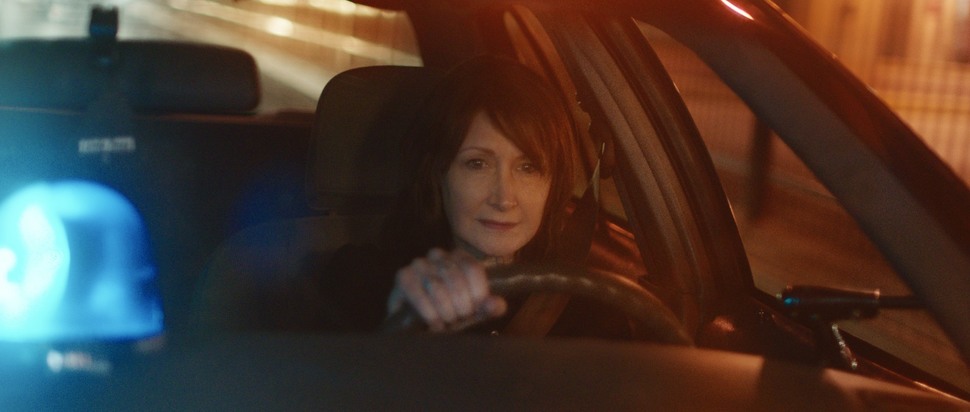Carol Morley on her dream-like noir Out of Blue
Carol Morley's latest film is a hard-boiled police drama based on a Martin Amis novel and it unfolds like a Lynchian dream noir. We speak to the Salfordian director about the art of adaptation, gender and taking female-driven stories seriously
Since 2000, Carol Morley has established herself as one of the most singular voices in British independent filmmaking. Beginning with The Alcohol Years, her self-reflective investigation into her troubled 20s living in Manchester, through to 2014’s The Falling starring Maisie Williams, Morley has spent the past two decades crafting engaging and thoughtful films, often centred around women.
Her latest, Out of Blue, a loose adaptation of Martin Amis’s science-themed neo-noir Night Train, is no different. Told almost as if it were a Lynchian dream combined with elements of Polanski’s Chinatown, the plot follows hard-boiled detective Mike Hoolihan (Patricia Clarkson), who is called upon to investigate the murder of Dr Rockwell (Mamie Gummer), an astrophysicist. As Hoolihan digs deeper into the case, she struggles to comprehend what is going on around her, pushing her closer to a mental breakdown.
Many years ago, the late Nic Roeg had planned to adapt Amis’s book but never got around to it. It was the Don't Look Now director's interest in an adaptation that intrigued Morley when Roeg’s son, Luke, suggested she direct the film. Out of Blue marks Morley’s first literary adaptation, although she never felt beholden to sticking too closely to Amis’s book. “At some point it became a collaboration between me and Martin Amis, even though I hadn’t ever met him, and still haven’t met him,” says Morley, explaining how she approached the text.
Filmmakers have struggled with visualising Amis’s books over the years. An adaptation of Dead Babies starring Paul Bettany sank without a trace in 2000, while the BBC’s take on Money in 2010 couldn’t recreate the satirical vim of that seminal novel. Morley, though, was relatively unfazed. “I never wanted to make a description of the book,” she explains. “It got to a point where I almost forgot he’d written it.”
Morley isn’t being glib. Rather than approaching Out of Blue like your typical literary adaptation, she describes it as closer to covering a song. Anyone familiar with the book will recognise the themes and plot, but there are significant key changes, including Morley’s creation of Professor Ian Strammi – an anagram of Martin Amis – played by Toby Jones.
Whereas her most recent feature, The Falling, centred on exploring the emotional impact of sexual awakening, mother-daughter relationships and loss, Out of Blue is more of an intellectual enquiry. The film contemplates the field of cosmology from the point of view of a female detective – it’s no mistake she has a macho name and operates in a male-dominated world. What both films share is how they interrogate the female experience from a female perspective.
Look back over Morley’s credits and it’s obvious that she’s passionate about telling female-centric stories, but she is eager to clarify a few things. “I don’t do tick-boxing,” she explains. “I don’t say things like ‘I must have x number of women in the crew, or this many women in the film.’” Like any good director, she knows she has to do what’s best to serve the story. Female-driven stories are what she wants to tell, but this isn’t a political statement. “It’s like what Godard said, ‘the problem is not to make political films, but to make films politically,’” says Morley.
While Morley might be making strides, the industry hasn’t changed that much for women, even in the wake of #MeToo and #TimesUp. “Talking to script editors I know in the industry, they often hear feedback along the lines of ‘she’s not likeable enough,’ which isn’t something that would happen with a male character.” This is a problem she was conscious of with Out of Blue’s Mike. In the opening scene she seems to retch over the sight of a dead body, only to inform her colleague it’s actually the effect of a bad burger from the previous night. Morley rightly points out that it shouldn’t be a problem to have unlikeable women in film, but don’t call them 'strong women' – it’s a term that the director passionately dislikes.
This isn’t the only problem – film has always demanded that women take the point of view of male heroes. “Men haven’t had to take on women being the agency of a film for a long time,” she says. “That can feel uncomfortable to men and women because they aren’t used to it yet. It’s difficult, but it’s about cultural acceptance.”
This leads to an even bigger problem – those investing the money in films are scared to take risks, and female-driven stories are still viewed as a gamble. “A financier is probably going to invest in a type of film that has made money before,” Morley explains. But she’s not despondent, she’s just practical and happy to point out a few rays of hope. “The public bodies, like the BFI, BBC and Film4 will be at the forefront of creating an inclusive landscape, but what’s next is convincing financiers.”
At present, female-driven stories aren’t given the respect they deserve, something Morley knows all too well. “Over the years that I’ve been doing this, you see that there are stories that are female-led, or looking at girlhood or womanhood, but that they aren’t taken seriously.” She adds, “You’re not doing it because you are being political, but you soon realise you are entering into a political arena. Nothing’s off limits. Women that tell stories should be free to tell the stories that they want to tell.”
Out of Blue is released 29 Mar by Picturehouse Entertainment
